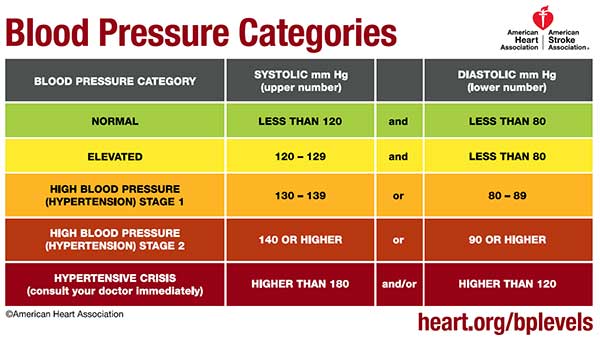10 Common Symptoms and Signs of High Blood Pressure
High blood pressure occurs when the pressure in your artries is higher than normal. You can measure the pressure in your arteries. Do have high blood pressure? Do you know what signs to look for? You’ll find information about the common signs of high blood pressure in this article.
Most Americans usually tend to ignore high blood pressure. Even those who do go on medication only stay on the medication for a short while. According to studies, 90% don’t stick with the recommended regime. Unless the blood pressure is kept under control it could lead to serious problems with vital organ such as your heart, kidneys, brain and eyes.
The normal numbers for blood pressure is 120/80. Between 120 and 140 is a pre-hypertensive stage that can be controlled by natural remedies such as exercise, watching your salt intake, quitting smoking, lowering cholesterol, and eating vegetables, etc. If your blood pressure goes over 140/90 then you would be considered to have high blood pressure, or a hypertensive patient.

How to Know if you have High Blood Pressure
High blood pressure usually has no symptoms, which is why it’s referred to as a silent killer. There are many symptoms associated with high blood pressure, including headaches, nosebleeds, dizziness, a flush face, and fatigue.
The only way to know for sure that you have high blood pressure is to measure your blood pressure. Doctors typically ask that it be measured twice daily – morning and evening. Measuring your blood pressure twice daily will overtime, allow you to get an accurate measure.
People with high blood pressure may experience many of these symptoms, but they just as often occur in those with normal blood pressure. If left for too long, or if the hypertension is severe enough, it can damage the brain and cause symptoms such as headache, fatigue, nausea, vomiting, shortness of breath, restlessness and blurred vision. In rare cases, it can even cause brain swelling which can lead to drowsiness and coma.
10 common symptoms of high blood pressure.
High Blood Pressure of Hypertension do not typically show symptoms but if you have any of the following ten symptioms, you should check your blood pressure immediately or see your doctor.
1. Severe Headache
2. Nosebleed (Epistaxis)
3. Breathlessness
4. Tinnitus (Ringing in Ears)
5. Sleepiness, Insomnia
6. Confusion
7. Fatigue
8. Excess sweating
9. Vomiting
10. Blurred vision
If you have not experienced the above symptoms, it does not mean you don’t have it as the most common side effect is that it has no symptom. The best way to stay healthy is to check your blood pressure regularly.




